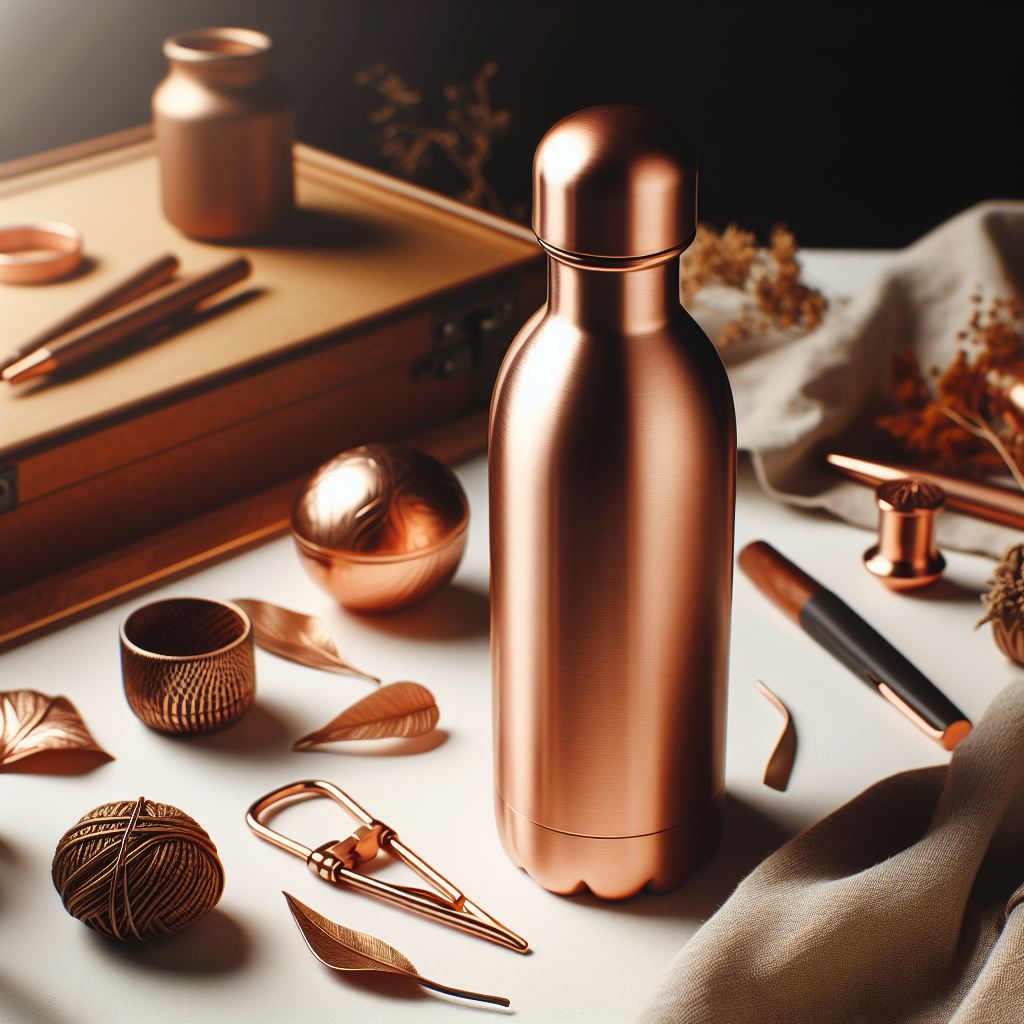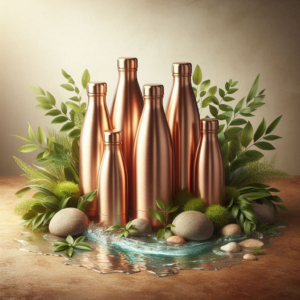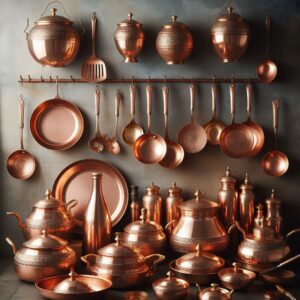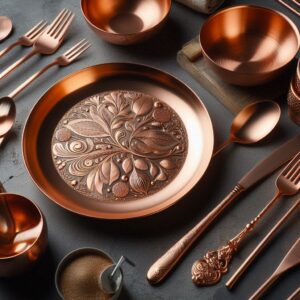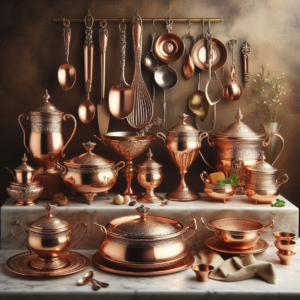Do Copper Water Bottles Work have become a trendy item in recent years, often lauded for their health benefits and sustainable material. They are claimed to offer advantages such as improved water quality through copper’s natural antibacterial properties and the provision of essential minerals. However, with the rise in popularity, there has also been skepticism and concerns about the actual effectiveness and safety of these bottles.
In this discussion, we aim to separate fact from fiction by examining the scientific evidence behind the claims made about copper water bottles. We will explore how copper interacts with water, the potential health benefits and risks, and the practical considerations of using copper bottles in daily life. Join us as we delve into the realities behind the copper water bottle trend to help you make an informed decision about their use.
The Historical Significance of Copper
Copper has been a material of choice for water storage in various ancient cultures due to its unique properties and benefits. Here’s an exploration of its historical significance:
Ancient Use of Copper for Water Storage:
- Ayurvedic Practices: In India, Ayurveda has long recommended storing water in copper vessels for health benefits. It was believed that water stored in copper became “sharp” and was absorbed by the body more efficiently.
- Egyptian Civilization: The ancient Egyptians used copper vessels to keep water fresh, leveraging copper’s ability to destroy undesirable viruses and bacteria.
- Indus Valley Civilization: Historical records from the Indus Valley Civilization, dating back to around 4500 BCE, indicate the use of copper vessels for their antimicrobial properties.
Reasons Behind Historical Trust in Copper’s Properties:
- Antibacterial Effect: Copper’s oligodynamic effect was known to kill bacteria, making it a natural purifier for drinking water in times when water purifiers were not available.
- Health Benefits: Copper is an essential trace mineral necessary for survival. It aids in the formation of collagen, increases iron absorption, and plays a role in energy production.
- Durability: Copper vessels were durable and could keep water safe for consumption over long periods, which was essential for long journeys and storage.
The Health Claims: Fact-Checking
When it comes to the health claims associated with drinking water from copper water bottles, it’s important to differentiate between anecdotal benefits and those supported by scientific evidence.
Here’s a fact-check of common claims:
- Immune System and Digestion: While copper is essential for the immune and digestive systems, deficiencies are rare, and the amount of copper leached from water bottles is minimal. Therefore, it’s unlikely that using a copper water bottle significantly impacts these systems.
- Wound Healing and Skin Health: Claims that copper water bottles can decrease wound healing times or boost your tan are not supported by scientific evidence. Copper does play a role in melanin production, but the connection to skin health via water bottles is tenuous.
- Joint Health and Iron Absorption: There’s no scientific evidence that drinking from copper water bottles improves joint health or iron absorption. These claims reflect copper’s roles in the body but not necessarily the benefits of drinking from a copper vessel.
- Antibacterial Effects: Copper has been shown to have antibacterial effects, which may help purify water. However, for copper to kill bacteria effectively, the water must be stored in the vessel for an extended period, such as overnight or up to 48 hours.
- Heart and Brain Health, Weight Loss, Anti-Aging: Claims of copper water contributing to better heart and brain health, weight loss, and anti-aging effects are not backed by scientific studies. These benefits likely reflect the general functions of copper in the body rather than specific outcomes from using copper water bottles.
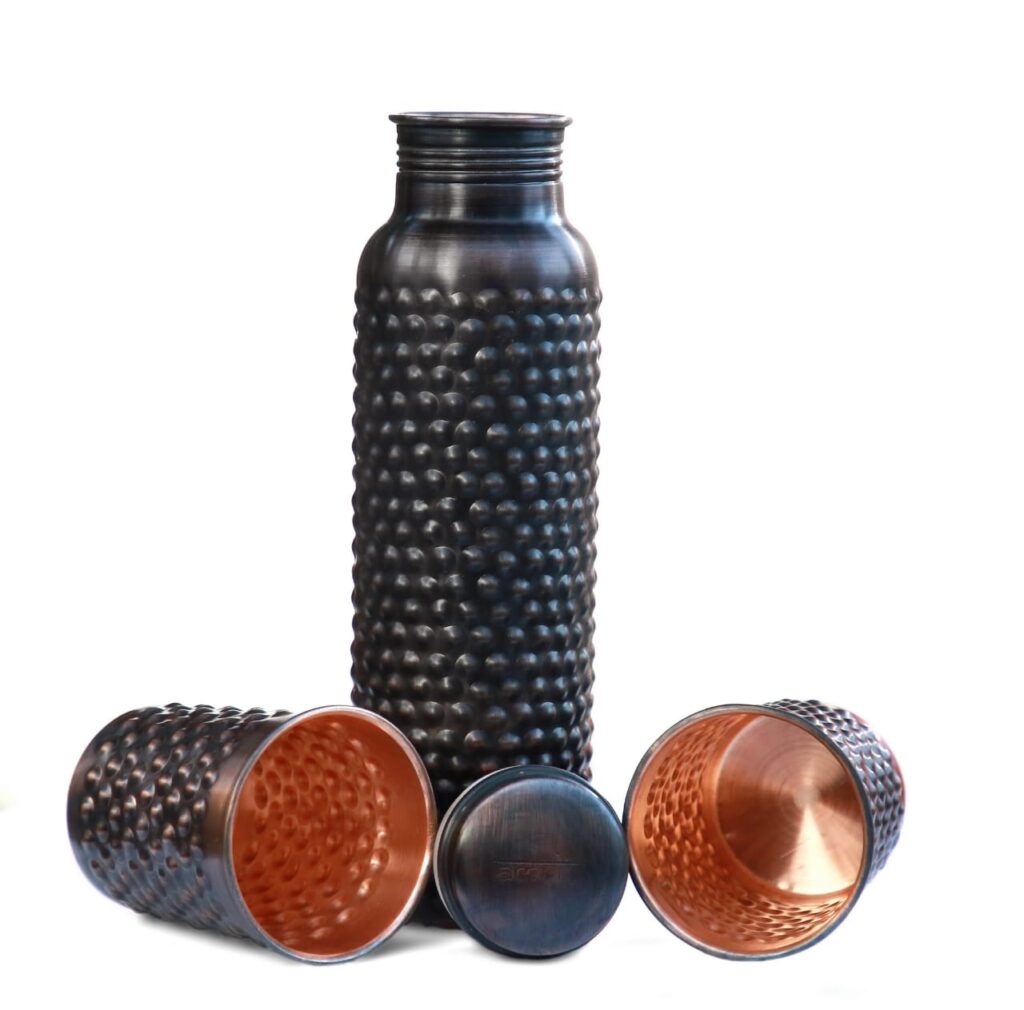
Copper’s Antimicrobial Properties
Do Copper Water Bottles Work ability to kill bacteria and other pathogens is rooted in its antimicrobial properties, which have been recognized and utilized for centuries. The science behind these properties involves several mechanisms:
- Generation of Reactive Oxygen Species (ROS): Copper can induce the generation of ROS, which can cause oxidative damage to cell membranes, DNA, and other essential cellular components, leading to the death of microorganisms.
- Membrane Disruption: Copper ions can bind to and disrupt the plasma membrane of cells or viruses, causing structural damage that makes the microbes susceptible to further damage from copper ions.
- Interference with Metabolism: Copper ions can overwhelm the inside of a cell, obstructing essential metabolic processes by binding to enzymes and halting their activity. This prevents the microbe from “breathing,” “eating,” “digesting,” or “creating energy,” ultimately leading to its death.
These antimicrobial properties are particularly relevant to copper water bottles for several reasons:
- Water Purification: When water is stored in a copper vessel, the metal ions leach into the water, creating an environment hostile to harmful microbes. This can help keep the water clean and safe to drink, as copper can inhibit the growth of bacteria such as E. coli and Salmonella.
- Long-Term Storage: The antimicrobial effect of copper is beneficial for water stored over long periods, as it can prevent the growth of bacteria and algae, which might otherwise proliferate in stagnant water.
- Health and Safety: By reducing microbial contamination, copper bottles can contribute to improved overall health and well-being, especially in areas where water quality may be compromised.
Practical Considerations: Durability and Maintenance
When considering the practical aspects of using copper water bottles, particularly their durability and maintenance, it’s helpful to compare them with other materials like stainless steel, glass, and plastic:
Copper Water Bottles:
- Durability: Do Copper Water Bottles Work is known for its durability and longevity. It doesn’t rust, but it can develop a patina over time, which some may find aesthetically pleasing.
- Maintenance: Copper water bottles require regular cleaning to prevent oxidation. It’s recommended to clean them with a natural acidic solution like lemon or vinegar every 30 days.
Stainless Steel Water Bottles:
- Durability: Stainless steel is corrosion-resistant and typically lasts longer than glass or plastic because it does not leach chemicals when exposed to sun/heat.
- Maintenance: Stainless steel bottles are generally dishwasher safe and easy to maintain. They do not require special cleaning agents and are less likely to retain odors or tastes.
Glass Water Bottles:
- Durability: Glass is durable in terms of chemical resistance but can break easily if dropped. It does not leach chemicals and maintains the purity of the water.
- Maintenance: Glass bottles are easy to clean and are often dishwasher safe. However, they can be heavier and more fragile compared to other materials.
Plastic Water Bottles:
- Durability: Plastic bottles are lightweight and convenient, but they can degrade over time, especially when exposed to heat, which can cause leaching of chemicals.
- Maintenance: Plastic bottles are the easiest to maintain and are often dishwasher safe. However, they may retain odors and flavors and need to be replaced more frequently due to wear and degradation.
User Experiences and Anecdotal Evidence
Real-life user experiences and testimonials play a significant role in the popularity of copper water bottles. Here’s a look at some anecdotal evidence and how it contributes to their appeal:
User Experiences and Testimonials:
- Many users report improvements in their overall health after switching to copper water bottles, citing benefits like better digestion, improved skin health, and a boost in energy levels.
- Some testimonials highlight the convenience and durability of copper bottles, appreciating their eco-friendliness as a sustainable alternative to plastic.
- Users often mention the taste of water from the Best copper water bottles as being fresher and more revitalizing, which adds to the drinking experience.
Contribution to Popularity:
- Word-of-Mouth: Positive experiences shared among friends, family, and online communities can influence others to try copper water bottles, thus spreading their popularity.
- Health and Wellness Trends: With a growing focus on health and wellness, personal stories about the benefits of copper align with the interests of health-conscious consumers.
- Cultural Resurgence: Anecdotes that connect modern use to traditional practices, such as Ayurveda, resonate with individuals looking for holistic health approaches.
Conclusion
Do Copper Water Bottles Work have been a subject of interest due to their historical use and purported health benefits. While there is some scientific evidence supporting copper’s antimicrobial properties, many of the health claims lack robust scientific backing. Here’s a balanced view based on our findings:
Antimicrobial Properties: Copper’s ability to kill bacteria is well-documented and can be beneficial for storing water, especially over extended periods.
Health Claims: Many health claims, such as improved digestion and skin health, are primarily anecdotal and not strongly supported by scientific research.
For Health-Conscious Users: If you’re interested in the potential health benefits of copper, using a copper water bottle could be a worthwhile experiment, but it should not replace medical advice or treatment.
For Eco-Friendly Choices: Copper water bottles are a sustainable option that can help reduce plastic waste and are worth considering for those looking to make environmentally responsible choices.
Maintenance: Regular cleaning is necessary to maintain the bottle’s effectiveness and appearance. Natural acidic solutions like lemon juice or vinegar can be used for cleaning.

